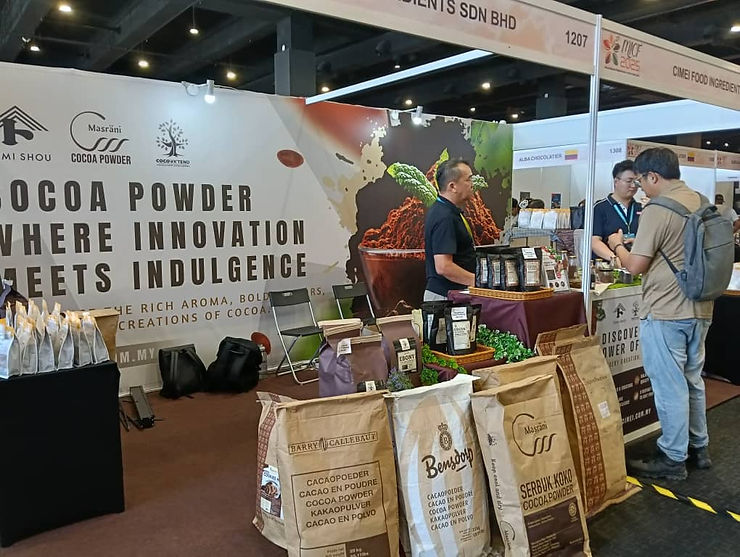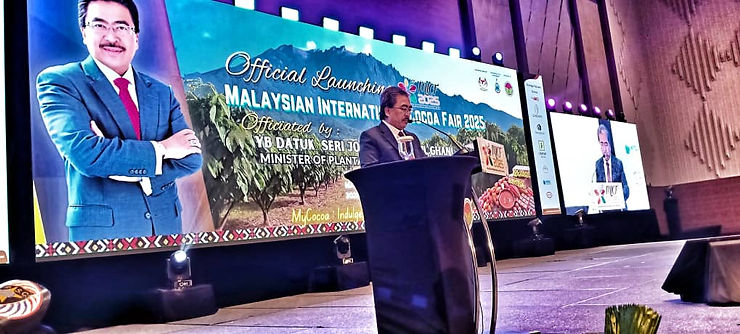Malaysia’s Cocoa Sector Poised for Growth Amid Global Challenges
- nabalunews
- May 26
- 2 min read

26 May 2025
KOTA KINABALU: While Malaysia may no longer be a major producer of cocoa beans, the country’s influence in the global cocoa industry remains strong and growing.
Speaking when launching the Malaysian International Cocoa Fair (MICF) 2025, Minister of Plantation and Commodities, Datuk Seri Johari Abdul Ghani, outlined both the opportunities and the pressing challenges facing the nation’s cocoa sector.
Johari praised the Malaysian Cocoa Board (MCB) for hosting the international fair in Sabah, a state he described as playing a critical role in the cocoa industry’s ecosystem.

“Organising the MICF here gives us an opportunity to showcase the important role Sabah plays in the cocoa industry,” he said.
Malaysia continues to punch above its weight in the downstream segment of the cocoa industry.
With 370,000 tonnes of cocoa beans ground annually, the country remains one of the top five cocoa grinders globally.

In 2024 alone, cocoa and cocoa product exports jumped by 29 percent to 690,000 tonnes, valued at RM15 billion, a reflection of Malaysia’s strength in value-added production and innovation.
The government is now setting its sights on premium markets, Johari highlighted, adding that Malaysia’s push into high-value segments such as fine-flavour, single-origin, and organic beans to cater to niche global demand focused on quality and health.
“This will enable us to position our brand at the high end of the value chain,” he noted.

Despite the strong performance in downstream activities, Malaysia’s upstream cocoa sector tells a different story.
Cocoa bean production remains relatively small, with just 445 tonnes produced in 2024, a 65 percent increase from 2023, but still a fraction of the 490,000 tonnes imported to meet domestic processing demand.
To address this imbalance, Johari emphasised the government's commitment to revitalising cocoa plantations across the country.
Through MCB, efforts are underway to expand planted areas and increase yields, calling on planters, investors, and cooperatives to join a national drive to boost production.
Income-enhancing programmes for farmers and SMEs are also being implemented, including cluster programmes and the formation of cooperatives to support smallholders.
Meanwhile, government-led R&D efforts are producing high-yielding, disease-resistant cocoa varieties and refining post-harvest processing techniques.
In line with shifting global consumer and regulatory expectations, sustainability and traceability are now central to Malaysia’s cocoa agenda.
“These have become non-negotiable policies that will continue to shape the industry’s direction,” Johari asserted.
To this end, the national Cocoa Traceability System now covers 40% of the industry and will underpin the upcoming Malaysian Standard Premium Cocoa certification.
Malaysia is also undertaking a Low Carbon Cocoa Feasibility Study to align the sector with climate-smart agricultural practices.
Johari expressed strong optimism about the future of Malaysia’s cocoa industry, noting that the platform provided by MICF 2025 is an opportunity for collaboration and innovation.
“Let us work together to build a resilient and inclusive industry that uplifts communities, empowers farmers, and supports our planet,” he concluded.
As Malaysia navigates a shifting global cocoa landscape, the balance of challenges and opportunities appears to be tipping in favor of growth, driven by innovation, sustainability, and strategic partnerships.
Also present during the event were Datuk Dr Ramle Kasin Director General of MCB, Datuk Matbali Musah MCB Chairman and speakers Michel Arrion, Executive Director of International Cocoa Organisations and Juan Aranois CEO of Nestle Malaysia.


















Comments